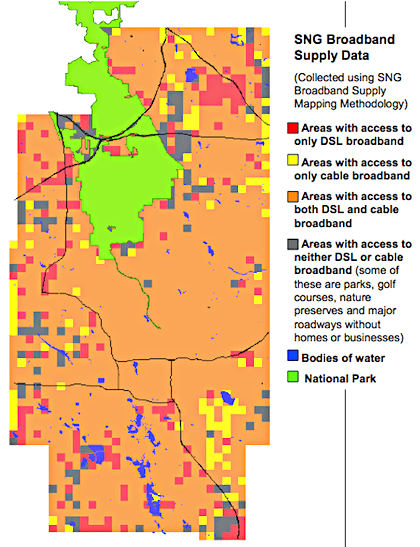
Is this worth $350 million of your taxpayer dollars?
North Carolina residents should be outraged at Rep. Bill Faison, the Democratic chairman of the state House Select Committee on High-Speed Internet Access in Rural Areas. He’s set to do for North Carolina broadband what Hurricane Katrina did for urban renewal in New Orleans. Faison, along with some other cronies, are examples of what is wrong with broadband stimulus planning when certain elected officials open their doors on big special interests, and slam them on the fingers of actual consumers.
Eight years ago, the North Carolina legislature commissioned the state to produce accurate, detailed broadband maps, depicting who has access to what broadband services, if any, across the Tar Heel State. e-NC, an organization of excellence recognized worldwide, set about not only doing broadband mapping, but also advocating for consumer and business interests across the state by pushing for higher quality and faster service. e-NC’s mapping standard has been recognized by the European Commission, Microsoft, and IBM for its detailed, accurate depictions of broadband service.
e-NC has had its work cut out for it. AT&T and other North Carolina telecom providers have stonewalled the group since day one, refusing to disclose “private company information.” Where e-NC could obtain agreements, they came with ludicrous non-disclosure agreements that were the equivalent of ‘here is the information you requested, but you cannot use it in your maps.’
That’s where Faison comes in. He sends out an invitation to the media to announce North Carolina finally has a broadband map available, and then proceeds to slam e-NC because it produced maps that, at one point, he compared with “swiss cheese.” Faison is fully aware that e-NC had been complaining about provider stonewalling, and he did nothing to stop it. But then he did something even worse: he praised the very providers who did the stonewalling and are now in charge of producing the “detailed maps” that the providers want the legislature to see.
Faison said, “In the face of legislation recommended by the Committee which would have required the providers to disclose precise information to the Legislature for our staff to generate a detailed map of availability, the providers have come together and collectively decided to provide the information through Connected Nation, to not only provide the “street address” map but also to make the map both accessible and interactive through the internet. Special recognition should be given to AT&T, Embarq, Sprint, Time Warner Cable, The Cable Association, the Telephone Co-op association, and Alltel for their work on this matter.”
Shameful.
Of course, Faison’s anti-consumer efforts on behalf of his good friends in the telecommunications industry are no secret to our North Carolina readers. Faison was one of the proponents of the anti-consumer nightmare legislation S1004, which was hand-crafted by big cable and telephone companies to stop municipal broadband projects across the state. Faison is a menace for consumer interests in North Carolina.
Faison doesn’t care, of course. He has his eyes on some of that $7.4 billion in broadband stimulus money he hopes to grab for the state AT&T, Embarq, Sprint, Time Warner Cable, and any other provider that will try and use their own maps to “qualify” for the tax dollars you and I are going to hand over for broadband development.
Faison said: “North Carolina will be one of only six states with a detailed “street address” interactive map of broadband availability. It positions us advantageously to obtain a portion of $7.4 billion in Stimulus money available for broadband deployment. A map, such as ours, is now a precondition for obtaining this portion of the Stimulus money. The collaborative work of the Committee and the providers has now postured North Carolina in the most favorable of positions to not only obtain this portion of the Stimulus money, but also to advance broadband deployment for our people.”
In other words, by replacing reality with the telecom industry’s own version of reality, they hope to sneak through applications that look good on paper, whether or not they accurately depict the real “on the ground” state of broadband in North Carolina. If I were a grant application reviewer with this kind of “detailed” conflict-of-interest map work, I’d disqualify the entire state from getting one penny.
As the excellent investigative piece by Art Brodsky points out over on Public Knowledge (thanks Stop the Cap! reader Michael for showing the way):
AT&T stiffs the state, and then makes up its own map, which state legislators accept. There is no transparency, no verification, no nothing. (But it is interactive.) The only way in which this can not be a total conflict of interest is to recall the (perhaps) apocryphal story of the Maryland state legislator who also owned a liquor store. He introduced a bill to help liquor stores and was asked if this bill was a conflict of interest. “How does this conflict with my interests,” he was said to have replied. Exactly.
Meanwhile, the oh-so-aptly named (well-)Connected Nation, packed to the rafters with big cable and telephone company lobbyists, is busily doing its part to flush $350,000,000 of taxpayer funding down the drain with its own “broadband maps” which resemble the crayoning work your 1st grade son brought home from school.
Connected Nation, a creature of AT&T, spent $7 million dollars of your taxpayer money to commission Connect Ohio, an affiliate, to map broadband availability in that state. The result was a map you could have drawn yourself during a TV show commercial break. I think I’ll use Light Pink myself.

Connect Ohio's "Broadband Map" for Summit County, Ohio
No, the blue speckles are not from blueberry pie stains. Those are bodies of water. What exactly does Connect Ohio’s map say? Not a whole lot. Basically, it claims the areas in beautiful pink are locations where broadband service is supposed to be available. The whitish areas are outta luck.
Seven million well spent dollars there!
Meanwhile, here is a map from Strategic Networks Group, a company that was never eligible for federal mapping grant money:

Map from Strategic Networks Group, that didn't cost taxpayers a cent
Which map would you prefer to rely on? The $7 million dollar boondoggle from Connect Ohio or the zero taxpayer dollar map from Strategic?
Why didn’t Strategic get the contract? Because Sen. Dick Durbin, D-Illinois custom wrote language into the Broadband Data Improvement Act, that specifically defined who received the award money. Basically, it came down to only those well-connected politically with state governments (Connected Nation) getting the lion’s share. No merit-based mappers need apply.
Strategic’s maps were apparently too good. Take a look at this exceptionally detailed map they produced for just western Akron, Ohio (and notice this is page four of a series of detailed maps):

Unlike Connected Nation's maps, you WILL have to click to enlarge!
Stop the Cap! stands with Art Brodsky and Public Knowledge regarding this travesty:
The government notice setting out the terms for the mapping grants was sadly deficient. Even if one grants that Connected Nation was wired in under the terms of a misguided bill, the agency notice of funds availability had no conflict-of-interest safeguards. There are no requirements for transparency or for verification of information. There are no standard data sets to make sure all the maps measure the same things. Instead, there are what appear to be protections for “confidential” information that could render the process useless.
Perhaps some of these deficiencies can be cured at the program moves forward. Perhaps not. In either case, these cautionary tales are getting a bit tiresome. Jury-rigged RFPs, no-bid contracts, hot-wired legislatures and state agencies are no way to run a program as important as broadband.
The stimulus broadband mapping program is set up for massive failure unless changes are made. Congress has to allow more competition for grants. The Durbin argument that private, for-profit companies shouldn’t do public work like broadband mapping, while non-profits should, falls apart when one considers the advantages of an independent company vs. a compromised non-profit. The agencies responsible need more detailed criteria to protect the public investment. Consistency, transparency, public verification and less protection of information are needed. Maybe then can an #epic fail can be avoided.
“The price of bundled packages has been steadily driven downwards as the major providers battle it out for market share and households subscribing separately for their three services could save £230 or more per year through taking out a bundled package,” said Michael Phillips, product director, BroadbandChoices.co.uk.


 Subscribe
Subscribe






